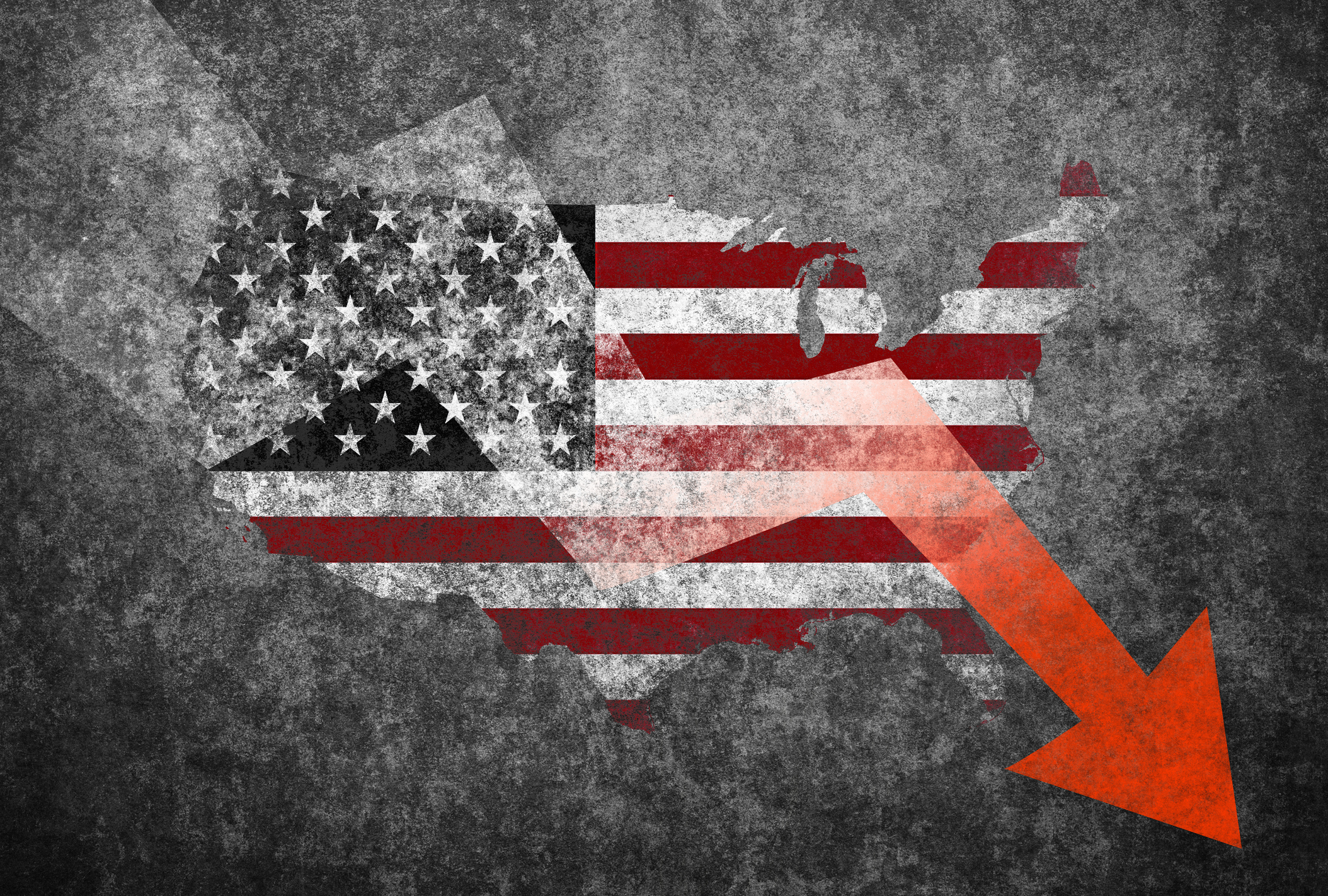Will there be a US recession in 2025?
Donald Trump’s “Liberation Day” tariffs have thrown the global economy into chaos. Could the new import taxes help tip the US economy into recession this year?


Get the latest financial news, insights and expert analysis from our award-winning MoneyWeek team, to help you understand what really matters when it comes to your finances.
You are now subscribed
Your newsletter sign-up was successful
Want to add more newsletters?

Twice daily
MoneyWeek
Get the latest financial news, insights and expert analysis from our award-winning MoneyWeek team, to help you understand what really matters when it comes to your finances.

Four times a week
Look After My Bills
Sign up to our free money-saving newsletter, filled with the latest news and expert advice to help you find the best tips and deals for managing your bills. Start saving today!
Before Donald Trump won the US election back in November, the chances of his win resulting in a US recession seemed miniscule.
In fact, the opposite was the case. Whatever critics of the former president said about him, the general perception was that the former The Apprentice host and business magnate had economic matters under control.
That perception is changing fast. “Liberation Day” tariffs seemingly risk dragging the US economy into negative territory.
MoneyWeek
Subscribe to MoneyWeek today and get your first six magazine issues absolutely FREE

Sign up to Money Morning
Don't miss the latest investment and personal finances news, market analysis, plus money-saving tips with our free twice-daily newsletter
Don't miss the latest investment and personal finances news, market analysis, plus money-saving tips with our free twice-daily newsletter
The S&P 500 – along with other major US indices – is nosediving as global investors brace for a potential US recession. The flagship index fell almost 4.5% within two hours of opening on 3 April, following Trump’s announcement of far-reaching tariffs.
“Markets are taking fright as you would expect, with recession talk leading the word cloud,” says David Coombs, fund manager at Rathbone Multi-Asset Portfolios. “Sovereign bond yields lower, US Dollar lower and equities gaping down in the sectors most impacted,” he adds.
Could Trump’s tariffs cause a US recession?
Even if not predicting an outright recession, most experts are currently revising their growth expectations for the US economy downwards.
“Trump’s opening salvo points to higher tariffs than we were expecting, and our economic forecasts are being adjusted downwards with an expectation of around 1% US GDP growth for 2025,” says Johanna Kyrklund, group chief investment officer at Schroders.
“We see value in government bonds as a hedge against recession for the first time in this cycle,” she adds.
The GDPNow model, a statistical tool used by the Federal Reserve Bank of Atlanta to forecast US economic output, now predicts a 3.7% contraction in the US economy during the first quarter of 2025.
What is a recession?
A recession is a substantial downturn in a country’s economic activity.
As a rule of thumb, most economists define a recession as two consecutive quarters of negative gross domestic product (GDP) growth, though this isn’t necessarily the only metric used.
The length of a recession is usually measured from the quarter at which GDP started to contract until the one in which it returned to expansion.
Some famous periods of recession in the US are the Great Depression during the 1920s, the Great Financial Crisis that began in 2009, and the recession that followed the bursting of the dotcom bubble.

A stockbroker tries to sell his car during the Great Depression, one of the most severe recessions in US history.
While a recession is usually defined in terms of a particular economy, they often take place on a global scale thanks to the interconnectedness of modern global trade.
So a US recession wouldn’t just impact the US; it could have significant knock-on effects for your finances given the weight that the US carries in the global economy.
What would a US recession mean for your money?
For a start, a contraction in the US stock market – like the S&P 500’s collapse on the day following the tariff announcement – would have a major impact on your savings and investments, given that most global trackers are weighted towards US companies (of the 20 largest companies in the world by market capitalisation, 17 are based in the US).
Beyond that, it’s hard to say exactly what impact a US recession would have on finances for people living in the UK.
Assuming that tariffs were driving the contraction, though, there would likely be a rise in global inflation.
“The biggest impact that the US economy going into a tariff-induced recession might have for UK citizens is to push up global inflation,” says Rob Morgan, chief investment analyst at Charles Stanley.
That in turn could make central banks, including the Bank of England, more reluctant to cut interest rates.
That “would lead to elevated borrowing rates in the UK”, says Morgan. “Things like mortgage rates could stay higher for longer.”
How likely is a US recession?
According to economists at Capital Economics, the likelihood of a US recession depends largely on what Trump does with the funds he raises from tariffs – which they estimate will total somewhere around $700 billion, or 2.3% of US GDP.
“The impact on the real economy depends crucially on what is done with that additional tax revenue,” write Neil Shearing, group chief economist, and Paul Ashworth, chief North America economist, at Capital Economics.
“If it is given back to consumers via other tax cuts, then economic growth may not suffer too badly. If it is used to pay down the budget deficit, then this amounts to a fiscal tightening of more than 2%, which means the economy would be lucky to avoid a recession.
“We assume the former, but even then we expect GDP growth to average closer to 1.5% annualised over the next four quarters.”
That’s below the 1.7% forecast for 2025 that the Federal Reserve lowered its own forecast to, from 2.1%, in December.
That decision was taken before the extent of Trump’s tariff regime was known. The Fed’s next meeting – on 6-7 May – will be one to keep an eye on.
Get the latest financial news, insights and expert analysis from our award-winning MoneyWeek team, to help you understand what really matters when it comes to your finances.

Dan is a financial journalist who, prior to joining MoneyWeek, spent five years writing for OPTO, an investment magazine focused on growth and technology stocks, ETFs and thematic investing.
Before becoming a writer, Dan spent six years working in talent acquisition in the tech sector, including for credit scoring start-up ClearScore where he first developed an interest in personal finance.
Dan studied Social Anthropology and Management at Sidney Sussex College and the Judge Business School, Cambridge University. Outside finance, he also enjoys travel writing, and has edited two published travel books.
-
 Should you buy an active ETF?
Should you buy an active ETF?ETFs are often mischaracterised as passive products, but they can be a convenient way to add active management to your portfolio
-
 Power up your pension before 5 April – easy ways to save before the tax year end
Power up your pension before 5 April – easy ways to save before the tax year endWith the end of the tax year looming, pension savers currently have a window to review and maximise what’s going into their retirement funds – we look at how